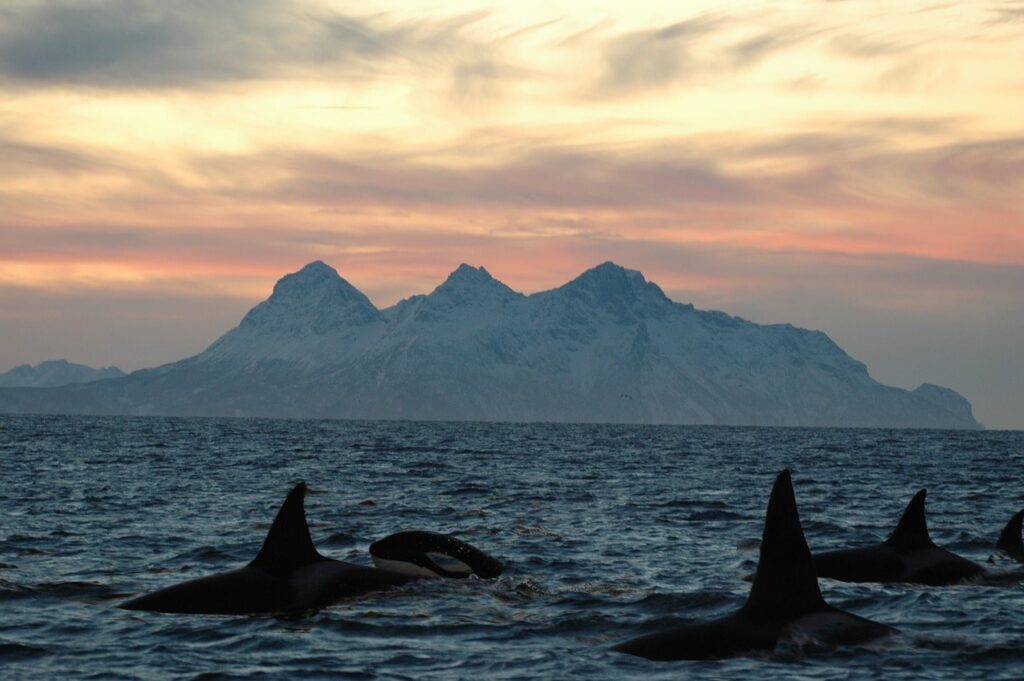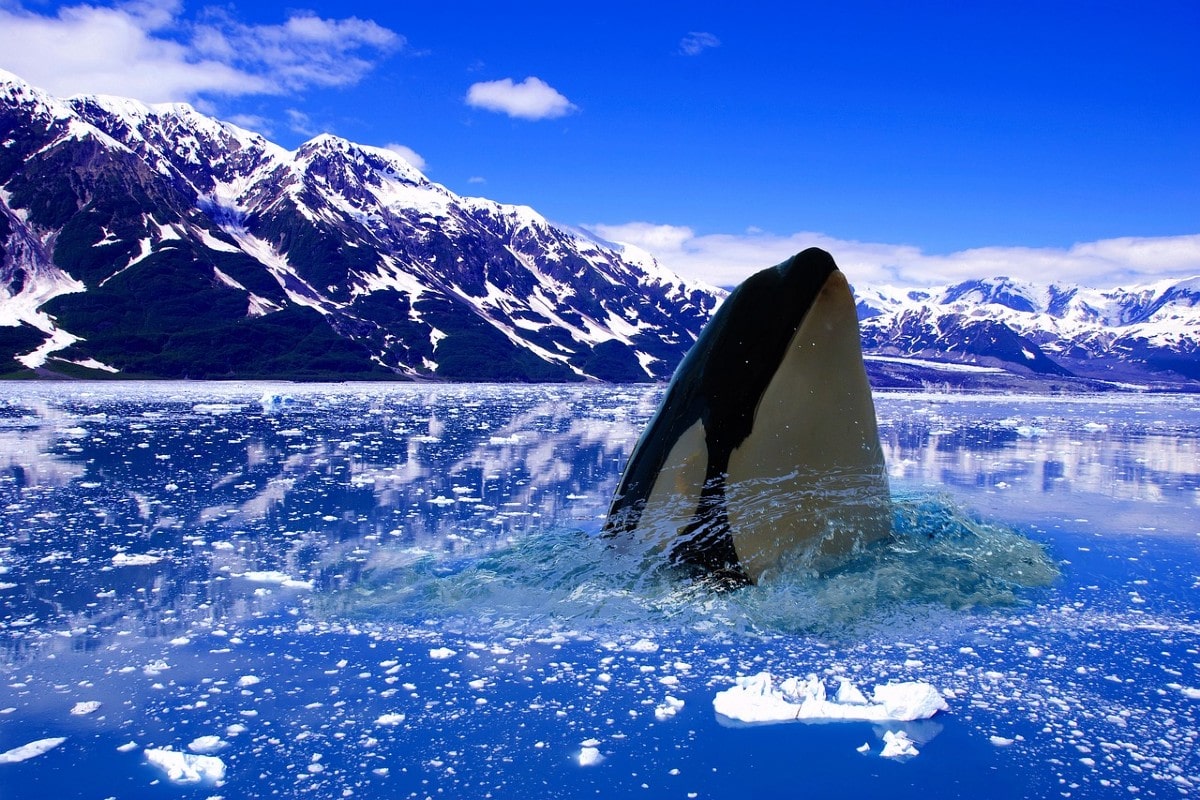Orcas, also known as killer whales, are fascinating ocean animals. They are the apex predator in their natural environment. On the other hand, the majestic polar bear earned the right to be feared on land in the cold northern parts of the world, the Arctic. Killer whales are not restricted to just one region. They live in all oceans, including the Arctic Ocean. Also, polar bears are excellent swimmers, and both animals can run into each other. Since these two predators live in the same region, do orcas eat polar bears or vice versa? The findings surprised us too. Read below.
Do Orcas Eat Polar Bears?
In short, orcas do not eat polar bears. It isn’t because orcas preying on polar bears could not happen. Their natural environments overlap in the Arctic Ocean. These apex predators have ample opportunities to take a bite at each other. They also hunt for the same prey, seals. However, there is no evidence to suggest that orcas eat polar bears. This is not to say it never happens. Polar bear cubs could be particularly vulnerable to killer whale attacks. Orcas could use the same hunting technique as they do with seals.
They stealthily approach their prey resting on ice sheets and pull them under the water using their teeth. In the water, seals don’t stand a chance against the bigger and faster killer whales. If the ice sheets are smaller, the smart orcas use their body to rock the ice sheet for the seal to eventually slide off. In the water, it is a game over.
Carcass: Do Orcas Eat Dead Polar Bears?
While orcas do not attack polar bears, they will not refuse the invitation of a dead polar bear. Orcas are opportunistic carnivores with a varied diet which includes seals, fish, turtles, sea lions, walruses, turtles, penguins, seabirds, dolphins, and other whales. They are also known to hunt and eat the biggest mammal on Earth, the blue whale.
Just like orcas, polar bears are also opportunistic carnivores. Polar bears’ primary source of food is seals. Occasionally, they hunt for walruses, narwhals, or beluga whales, if an opportunity comes or there isn’t enough food available. When hungry, polar bears make risky moves against bigger animals, which can cost them an injury or their life.
Polar bears also prey on carcasses of other animals, and killer whales are no exception. So, if a dead orca washed up on shore, a hungry polar bear would certainly take the opportunity to fill its stomach.
Also Read: How Long Do Orcas Live in the Wild?
Potential for Future Bloody Encounters
While there is no evidence orcas actively search for and eat polar bears, future encounters could happen. The reasons for this are human activity and global warming. Both orcas and polar bears have to adapt to increasingly changing environments.
Orcas aren’t lone hunters. They live in pods (groups) of 10 to 40 individuals where the females are in charge. They use echolocation as a way to communicate and hunt. Echolocation (sound waves) helps orcas locate faraway prey, ‘talk’ to each other, and organize coordinated attacks.
However, busy ferry and cargo routes make hunting difficult for orcas because of noise pollution. The Arctic waters are less accessible for commercial cargo ships and an ideal hunting place for killer whales. Furthermore, there are plenty of food resources in the Arctic, unlike in warmer oceans.
Polar bears, on the other hand, have to deal with a shrinking habitat. Scientists estimate that the Arctic loses 14% of its ice every decade due to global warming. Ice is vital for polar bears when they hunt for seals. Also, recent reports suggest that polar bears swim across the ocean to Canada in desperate search for food in the summer months.
So, do orcas eat polar bears? Though orcas do not eat polar bears, killer whales’ preference for colder waters in the Arctic, coupled with polar bears’ diminishing hunting grounds, could make it a reality in the future.

What Makes Orcas such Good Hunters?
In one word: intelligence. Killer whales are considered the smartest sea animal, and their hunting techniques leave even marine biologists in awe. However, intelligence alone is not what makes them such effective predators. Orcas aren’t lone hunters. They hunt in packs outnumbering their prey. They also learn to adapt their style to different animals of prey.
Other Characteristics Making Orcas Marine Apex Predators:
Intelligence: Orcas, along with dolphins, are one of the smartest sea creatures on our planet.
Hunting Technique: Hunt in packs of up to 40 individuals
Echolocation: Allow orcas to target prey over long distances and communicate with one another.
Speed: Orcas can reach speeds of up to 35 miles per hour. More on that here: How Fast Can Orcas Swim?
Bite Force: Though based on simulations only, the enormous bite force of an orca (19,000 PSI) is almost five times bigger than that of the white shark (4,000 psi).
Orca vs. Polar Bear: Who Wins the Fight?
If we assume the contest happens in the water instead of land, the orca will undoubtedly win the fight. Let’s just say it wouldn’t even be a fight. Orcas boast clear advantages.
They are larger and heavier than polar bears. The average male killer whale can be up to 26 feet (8 meters) long and weigh 6,000 kg (13,230 pounds) compared with 9 feet (2.7 meters) and 1,320 pounds (600kg) for the average male polar bear. That is three times as long and ten times as heavy. Want to know How Much Does a Polar Bear weigh? , read this article about polar bear’s weight.
Orcas also win in the bite force contest. Because killer whales are bigger with a larger jaw and jaw muscles, they could kill a polar bear in one strike. Polar bears’ bite force is only around 1,200 PSI compared to the estimated 19,000 PSI of the orca.
Add other factors, such as orcas’ intelligence, speed, echolocation, and pack-hunting tactics and you will get a cruelly unfair fight.
In conclusion
While we learned that orcas don’t eat polar bears, it is not to say it has never happened. There is simply no evidence to suggest the opposite. There are abundant food resources for the orcas to eat in the Arctic Ocean. Killer whales and polar bears do hunt for the same prey, seals; however, no bloody encounters have been reported. As the landscape and availability of food change in the Arctic, future clashes between the orca and the polar shouldn’t be ruled out.

